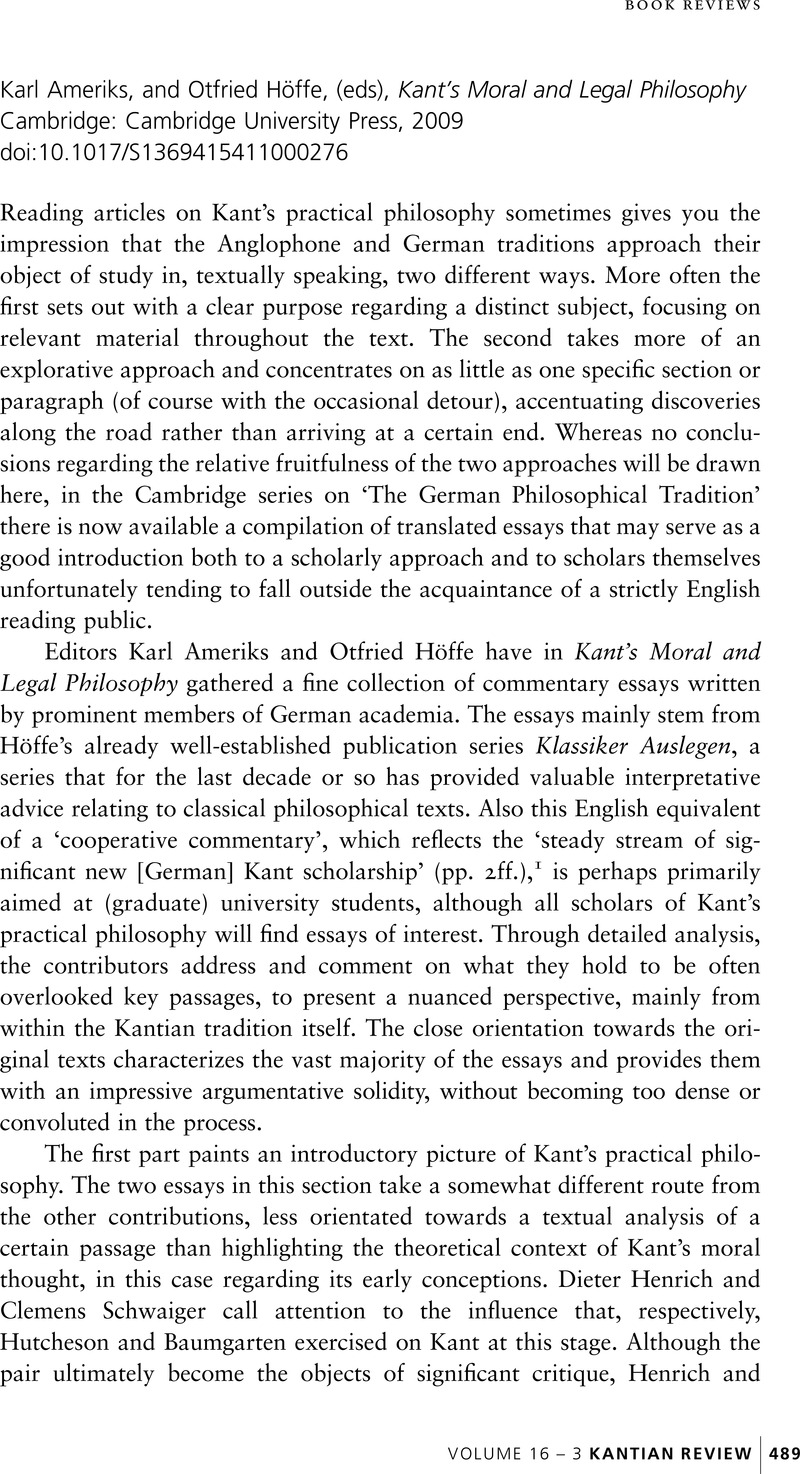No CrossRef data available.
Published online by Cambridge University Press: 28 September 2011

1 References to this work are indicated simply with ‘p.’ + page numbers; references to Kant are listed (volume: page, line) according to the Akademie edition.
2 This is obviously of great importance to Kant's later theory, cf. Schwaiger's direct reference in this regard to the Groundwork, towards which he seems primarily orientated in his interpretation, hence also to the practical realization of ‘morality’. It would, however, also have been of great interest to see how Schwaiger would have related this ‘radicalisation of the problem of obligation’ to Kant's texts on natural right and legal philosophy. For instance, Kant's regrettably often overlooked 1786 review of Hufeland's Versuch über den Grundsatz des Naturrechts and its inherent critique of any Wolffian natural rights conception is concerned with exactly this problem, but then rather from a distinctively legal (or natural right) perspective.
3 Originally written for a German reading audience, almost all essays in the anthology wholly refer to the German Kant debate. Most literature references are therefore, unfortunately (however natural in a publication series on ‘The German Philosophical Tradition’), not available to exclusively English readers.
4 Schönecker presents these five forms and their constellations as: ‘(a) common moral rational knowledge, (b) philosophical moral rational knowledge [(a)–(b) = section I], (c) popular ethical thought, (d) metaphysics of morals [(c)–(d) = section II], and (e) critique of pure practical reason [(d)–(e) = section III]’ (p. 101), with ‘close relationships … between a and c and between b and d’ (ibid.). As asserted in the essay, the non-identity of b and c proves not only that section II is not concerned with a transition from b to d, but also more clearly accentuates the ‘natural dialectic’ (p. 111, cf. 4: 405, 13) between common human reason and practical philosophy.
5 Cf. his footnote on pp. 96–7: ‘In order to avoid possible misunderstanding, I shall distinguish, where necessary, between the metaphysics of morals as an overall concept and project (mm1), Kant's ‘future’ metaphysics of morals (mm2), and metaphysics of morals as part of section II of the Groundwork (mm3)’.
6 Especially Pieper's and Ricken's essays have aspects that I am not fully convinced present the best (or at least only viable) approach. One example: both must in some way be said to be concerned with the problem of a realisation and/or guarantee of the morally good in a morally imperfect world. Their attempts try to bridge the gap between moral certainty at an individual level and the lack of a moral realization at a societal or even global level with the inclusion of other thematic passages in Kant. Whereas Ricken at times seems to more or less relegate this difficulty to religion and the hereafter (which hardly solves the original problem as I see it), Pieper wants to bring in from the third Critique the practical faculty of judgement. However fruitful these approaches may be, I still think they fall short of Kant's important insight regarding how individual and/or societal formations cannot themselves clarify (or at least consistently establish) the conditions under which this procedure can legitimately be exercised (cf. 6: 306). This insight calls for a civil condition, a state of public law that is not to be identified with religious, ethical, and/or societal formations – and ants and bees do not ‘form states’ (p. 194), as Pieper wrongly claims in an analogy to support her position. To my mind, the idiosyncrasy of right (Recht) is here, as at times elsewhere in the collection, not given sufficient consideration.
7 I am, however, somewhat puzzled by a few formulations in the essay, for instance the imprecise description of this ‘perfectly rightful constitution’ (6: 371) as an ‘uncoerced (!) association of free and equal human beings’ (p. 259); likewise the use of ‘republican’ in a term such as ‘republican society’ (p. 263), which I believe Kant reserves for exclusively state-related terms such as ‘republican constitution’ (cf. 6: 351 and 366) and ‘republican form of government’ (cf. 6: 353 and 377). Cf. my critique above of Pieper, with which I would believe Kersting would agree.
8 See Wolfgang Kersting, Wohlgeordnete Freiheit (Paderborn: Mentis Verlag, 2007), highly recommended for the able reader of German interested in Kant's philosophy of right.
9 For example, the term ‘morality’ is used both for Moral and Moralität, even though the latter has a more distinctive use in Kant than the former, as an overall term relating to morals in general. Further difficulty is caused by the differentiation in the Metaphysics of Morals (Metaphysik der Sitten) between Recht and Ethik, with Moral as a generic term. This makes it problematic to find precise English equivalents for complex constellations such as ‘moralisch-rechtliche Selbstverständlichkeit’ (‘morally and legally self-evident manner’, p. 285) and the more obscure and confusing ‘rechtsethische Komponente’ (‘rights-oriented ethical component’, p. 259). On another note: it is plainly wrong to translate ‘friedliche Nachbarschaft’ as ‘friendly coexistence’ (p. 247), when, as §62 of the Doctrine of Right clearly states, peacefulness (right) and friendliness (ethics) are two quite separate things.
10 At some points one might object that the liberty taken thereto is stretched a bit too far. Although it might ease the remaining parts of the sentence, the insertion of ‘the spirit of’ into ‘a process of republicanising the spirit of political authority’ (p. 260), when spirit is not mentioned in the original text, is close to changing the intention of the passage. And the insertions within ‘the spectacle of the French Revolution’ (p. 254) and ‘[t]he power of reason’ (p. 296) also seem excessive, when the original texts contain no ‘prefixes’ to ‘French Revolution’ and ‘reason’.
11 For instance, some concepts are rendered twice when the original contrasts them to their opposites (for example, virtue and happiness, p. 204; respublica noumenon and phaenomenon, p. 266). Page and volume references to Kant are also mixed up on a couple of occasions, and author references misspell one name twice (pp. 251, 277).